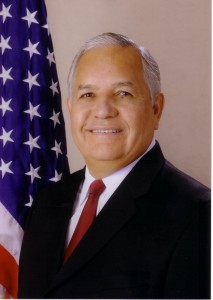US Rep Silvestre Reyes On Ed, Immigration, Rhetoric And More
 Economic development, border security, education, healthcare, and protecting America’s history as a diverse and immigrant friendly nation are all part of U.S. Congressmen Silvestre Reyes’ re-election platform this year. We spoke to Congressman Reyes recently, and he explained a little bit about the work that he has completed thus far, as well as his plans for the future. Most passionate when discussing border security and how it ties into investments in his district, he discussed the harmful ways in which the GOP debate around these issues is affecting not only constituents in his district, but Latinos across the country.
Economic development, border security, education, healthcare, and protecting America’s history as a diverse and immigrant friendly nation are all part of U.S. Congressmen Silvestre Reyes’ re-election platform this year. We spoke to Congressman Reyes recently, and he explained a little bit about the work that he has completed thus far, as well as his plans for the future. Most passionate when discussing border security and how it ties into investments in his district, he discussed the harmful ways in which the GOP debate around these issues is affecting not only constituents in his district, but Latinos across the country.
“It’s very frustrating to hear our own governor (Rick Perry) talk about the border communities being ‘war zones.’ It’s totally ludicrous and not even in touch with reality. The whole rhetoric is very anti-minority, very anti-immigrant, and keeps fostering this false impression of our border communities,” he said, noting that El Paso has been the safest city in the country for its size for several years in a row. “It’s a huge disservice to border communities in general, and specifically to places like El Paso because we are trying to work on economic development and attract new investors. They get a totally bogus view fostered by Governor Perry and people running for president who misrepresent what our border communities are like.”
When it comes to border security, Reyes has a unique perspective because of his role as a former border patrolman and as the Border Patrol’s first Latino Sector Chief, he is the only person in Congress with a background in border security. He notes that, while security has been increased between ports of entry, the actual ports where people, as well as goods, enter in great numbers every day, are understaffed. He noted that he has introduced legislation to invest in port infrastructure and hiring along both the southern and northern borders, but that getting it passed has been difficult due to Republican pushback when it comes to finding budgetary offsets.
Reyes alluded to Alabama’s recent anti-immigrant law, and the great economic toll that law has taken on the state, as well as places like Georgia and Arizona, as reasons he wants to keep working in Congress. He said that while visiting Alabama, he remembered again that, without immigrants in this country, entire industries — such as agriculture — shut down.
“We have to tell that story so that Americans in 2012 can evaluate: do we want to be aggressive and anti-diversity, anti-minority, on the one hand, or do we want to keep faith with our Constitution and our legacy that we’re a nation of immigrants?” he said.
Because El Paso is a military city, Reyes highlighted the work he had done to help bring more military investment to the area since he first took office in 1997. To that end, as well as to serve the needs of the residents of his district, Reyes has been working to create a medical center that incorporates civilian and military resources — such as a veteran’s hospital, medical school, research facilities and children’s hospital — in the city.
The congressman has also found a way to combine his work the intelligence committee with the great need for education opportunities in his district. By helping usher in two federal Centers of Excellence at the University of Texas at El Paso, one for intelligence and another for border security and immigration, Reyes told us that students at the institution now have many more opportunities. Everything from funding, resources, jobs, travel, security clearance, and access to government employment is now within reach for students at these institutions, with the secondary benefit of helping the country’s intelligence community become more diverse. Reyes proudly told us that, in 10 years on the intelligence committee, that diversity within the 16 agencies went from 4% to 30%.
All told, looking forward to 2012, Reyes noted that he believes the anti-immigrant, anti-Latino rhetoric is beginning to wear on the consciousness of voters. to that and, he hopes to continue to do good work for his district, and work on the issues that are important to them.
[Photo By U.S. Congress]
